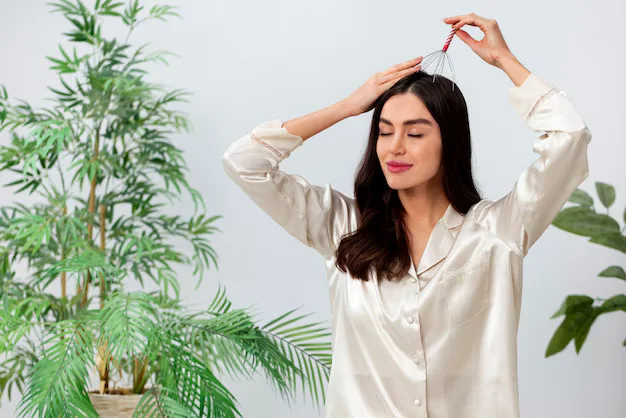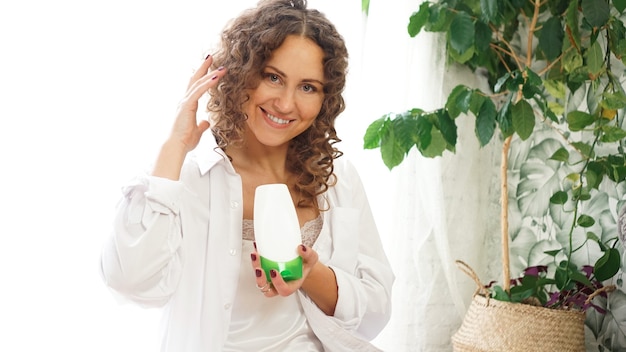Unlocking Secrets of Ayurvedic Hair Care

Key Takeaways Shortly
- Ayurveda offers a holistic and natural approach to hair care, emphasizing the importance of balance and natural ingredients.
- Understanding the Ayurvedic perspective on hair growth involves focusing on dosha balance and utilizing natural oils and herbs.
- Herbal treatments such as amla, bhringraj, and neem are recommended for addressing various hair types and concerns.
- Daily Ayurvedic practices like scalp massages and dietary changes can significantly support and enhance hair health.
- Incorporating Ayurvedic practices into your routine can lead to a balanced and sustainable approach to maintaining healthy hair.
Imagine a world where your hair is not just healthy, but also brimming with natural shine and strength. That's the promise of Hair Care in Ayurveda, an ancient system that has stood the test of time. Ayurveda believes in the harmony of body, mind, and spirit, extending this balance to how we care for our hair.
This article will explore the fascinating world of Ayurvedic hair care. We'll uncover why so many people are turning to this holistic approach for hair growth and shine. You'll gain insights into herbal hair treatments and how they can transform your hair routine.
As we journey through the facts and insights, you'll discover the secrets behind Ayurveda's enduring popularity. If you're seeking a natural and effective way to nurture your hair, this guide will provide the knowledge you need. Let's dive into the wonders of Ayurvedic hair care and see what it can do for you.
Don't wait or self medicate. Start chat with Doctor NOW
Understanding Hair Growth in Ayurveda
Ayurveda views hair as a reflection of one's overall health, linking it closely to the body's internal balance. Hair growth in Ayurveda is associated with the 'Pitta Dosha,' one of the three biological energies. When Pitta is out of balance, it can lead to hair issues like thinning or loss.
A fascinating fact is that the global Ayurvedic market is projected to reach $14.9 billion by 2026, as reported by the Global Ayurvedic Market Analysis. This growth shows increasing trust in traditional practices for modern health problems.
Ayurvedic practitioners often recommend herbs like Bhringraj and Amla for hair growth, known for strengthening hair and promoting a healthy scalp. These herbs are believed to nourish hair follicles and enhance blood circulation, which is essential for hair growth.
Incorporating these natural treatments into daily routines can help manage hair health effectively, blending ancient wisdom with modern needs.

Herbal Hair Treatments That Work
When it comes to caring for your hair, herbal treatments can be a game-changer. They often draw from ancient practices and offer natural solutions without the harsh chemicals found in many modern products. Here's a closer look at some effective herbal remedies:
-
Amla (Indian Gooseberry): Known for its rich vitamin C content, Amla is a powerful ingredient for hair growth Ayurveda. It strengthens hair follicles and combats premature graying. You can use Amla oil to massage your scalp or apply a paste made from Amla powder mixed with water.
-
Bhringraj: Often called the "king of herbs" for hair care in Ayurveda, Bhringraj is believed to promote hair growth and reduce hair fall. You can find it in oil form, which is great for regular hair massages to improve blood circulation in the scalp.
-
Neem: Known for its antibacterial properties, Neem helps in treating scalp conditions like dandruff. A Neem leaf paste can be applied directly to the scalp, or you can use Neem oil for a soothing massage.
-
Hibiscus: This vibrant flower isn't just pretty; it's also fantastic for hair care. Hibiscus is known to prevent hair loss and add shine. You can make a hair mask by grinding hibiscus flowers and leaves into a paste.
-
Aloe Vera: Known for its soothing properties, Aloe Vera is a great moisturizer for the scalp. It helps in reducing dandruff and maintains the natural pH balance of your hair. Apply Aloe Vera gel directly to the scalp for best results.
These herbal treatments are simple to incorporate into your routine. They bring the ancient wisdom of Ayurveda to your daily hair care, offering natural and effective solutions.
Daily Practices for Healthy Hair
In the quest for luscious locks, daily habits play a pivotal role. Let’s explore some simple yet effective practices to incorporate into your routine.
1. Gentle Hair Washing
Over-washing can strip your hair of natural oils. Aim to wash your hair two to three times a week. Use lukewarm water instead of hot, as high temperatures can damage hair cuticles.
2. Choose the Right Shampoo and Conditioner
Pick products that cater to your hair type—dry, oily, or normal. Look for shampoos and conditioners with natural ingredients like aloe vera or coconut oil. These can nourish your hair without harsh chemicals.
3. Regular Brushing
Brush your hair daily to distribute natural oils from the scalp to the ends. Use a wide-tooth comb or a brush with soft bristles to avoid breakage. Start from the tips and work your way up to the roots to minimize tangles.
4. Protect from Heat
If you use heat styling tools, apply a heat protectant spray first. This creates a barrier between your hair and the high temperatures, reducing damage and preventing split ends.
5. Hydration and Nutrition
Your diet affects your hair health. Stay hydrated and consume a balanced diet rich in vitamins and minerals. Foods like eggs, spinach, and nuts are great for hair growth and strength.
6. Regular Trimming
Trim your hair every 6-8 weeks to remove split ends. Regular trims help maintain healthy hair and encourage growth by preventing breakage.
By making these practices a part of your daily routine, you’re setting the stage for healthier, more vibrant hair. These steps don’t just improve the look of your hair—they enhance its overall health. So, why not give them a try and see the difference they can make?

Embrace the Ayurvedic Hair Care Routine
Taking care of your hair isn't just about products; it's a lifestyle. Ayurveda teaches us that nurturing your hair is part of a holistic approach to health. By integrating Ayurvedic practices into your routine, you can aim for healthier, stronger hair. Natural ingredients like amla, bhringraj, and neem can become staples in your regimen. These are known for their benefits in promoting hair growth and reducing hair fall.
Creating a personalized hair care schedule is key. Start by understanding your hair type and the specific needs it has. This will guide you in choosing the right oils, shampoos, and conditioners. Regularly massaging your scalp with Ayurvedic oils can stimulate blood flow and nourish the roots. Incorporate herbal hair treatments to provide extra care and tackle issues like dandruff or dryness.
Switching to an Ayurvedic routine might take some time to show results, but the benefits can be lasting. Your hair will be less exposed to harsh chemicals, which often lead to damage. Instead, you'll be embracing nature's remedies which have been trusted for centuries.
We'd love to hear how Ayurveda has changed your hair care journey. Share your experiences or questions in the comments below. If you found this article helpful, don't hesitate to share it with friends who might be interested. Dive deeper into the world of Ayurveda and discover more about its wonders. There's a wealth of information waiting to be explored!
FAQ For Ayurvedic Hair Care
What makes Ayurvedic hair care different from conventional methods?
Ayurvedic hair care is unique because it focuses on holistic wellness, using natural ingredients to balance the body's doshas (energies). Unlike conventional methods that may rely on chemical treatments, Ayurveda emphasizes maintaining health through natural and sustainable practices.
How does Ayurveda explain hair growth?
In Ayurveda, hair growth is linked to the body's overall health and the balance of the three doshas: Vata, Pitta, and Kapha. When these energies are balanced, the body functions optimally, promoting healthy hair growth. Ayurveda also highlights the importance of using natural oils and herbs to nourish the scalp and hair.
Which Ayurvedic herbs are beneficial for hair health?
Ayurveda recommends several herbs for hair health, including amla (Indian gooseberry), bhringraj, and neem. Amla is rich in vitamin C and antioxidants, bhringraj is known to promote hair growth and reduce hair loss, and neem has antifungal properties that can help maintain scalp health.
What daily practices can support hair health according to Ayurveda?
Ayurvedic daily practices for hair health include regular scalp massages with warm herbal oils, maintaining a balanced diet rich in nutrients, and managing stress through meditation and yoga. These practices help improve blood circulation to the scalp, nourish hair follicles, and promote relaxation.
How can I incorporate Ayurvedic practices into my hair care routine?
To incorporate Ayurvedic practices, start by identifying your dosha and choosing hair care products and rituals that balance it. Use herbal oils for scalp massages, wash your hair with natural shampoos, and include herbs like amla and neem in your routine. Consistency is key to achieving results.
Are there any dietary changes recommended for better hair health in Ayurveda?
Yes, Ayurveda suggests consuming a diet rich in vitamins, minerals, and healthy fats to support hair health. Include foods like fresh fruits, vegetables, nuts, seeds, and whole grains. Avoid excessive intake of processed foods, caffeine, and alcohol, as they can imbalance the doshas and affect hair health.
Can Ayurveda help with specific hair concerns like dandruff or hair loss?
Absolutely, Ayurveda can address specific hair concerns such as dandruff and hair loss through tailored treatments. For dandruff, neem and tea tree oil can be effective, while bhringraj and amla are recommended for hair loss. It's essential to address the root cause by balancing the doshas and improving overall health.
Got any more questions?
Ask Ayurvedic doctor a question and get a consultation online on the problem of your concern in a free or paid mode.
More than 2,000 experienced doctors work and wait for your questions on our site and help users to solve their health problems every day.

